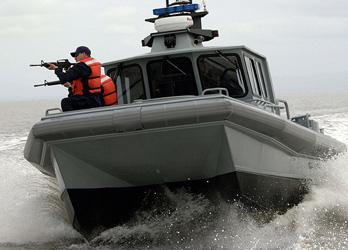
|  |  |  Americas & Beyond Americas & Beyond  
US Report: Drug Runners Shifting South from Mexico
 Robert Burns - Associated Press Robert Burns - Associated Press
go to original
March 02, 2010


| | Using a High Tech Patrol Boat, Coast Guard chase Drug Runners for an industrial video. (FX House Associates) |  |
Washington – Drug traffickers are adjusting to law enforcement pressures in Mexico by shifting their operations to smuggling corridors in Central America and the Caribbean.

"There is growing evidence that Mexico's drug trafficking organizations are already establishing a presence in these regions, particularly in some Central American states," the department said.

In a 2009 survey of global counter-narcotics efforts, the department singled out Bolivia and Venezuela for not doing enough to stop drug trafficking.

It cited Bolivia for creating conditions favorable to expanded drug production. And it said Venezuela is doing too little to stop shipments of illegal drugs from clandestine airstrips on its territory, though it credited Venezuela with increased seizures of illicit drugs in 2009.

The flow of drugs from Venezuela to the United States, Europe and West Africa increased sharply in 2009, the report said.

"A permissive and corrupt environment in Venezuela, coupled with increased drug interdiction efforts in the Caribbean, Central America and Mexico, has made Venezuela one of the preferred routes for trafficking illicit narcotics out of South America," the report said.

The State Department report also accused Venezuela of collaborating with drug-related groups in Colombia.

Although the annual report focused mainly on drug activity abroad, as required by Congress, it also cited U.S. demand for drugs as an important part of the problem.

The Venezuelan embassy defended the country's counter-narcotics efforts, citing an 11 percent increase in drug seizures last year.

"Our commitment to fighting illegal drugs is unequivocal, and we have seen impressive gains from the hard work of our law enforcement agencies," Ambassador Bernardo Alvarez said in a statement.

"Venezuela shares a long border with the world's biggest producer of cocaine," he said, referring to Colombia, "and a hemisphere with its biggest consumer," referring to the United States.

"So fighting drug trafficking will always be a regional challenge," he added.

In its report, the State Department praised the Mexican government for an ambitious campaign to combat drugs and traffickers. It cited increased seizures last year of cocaine, opium gum and heroin and said drug arrests, including those of high-profile cartel figures, reached a record high.

In what it termed a "balloon effect," the report said drug groups facing pressure in one territory tend to switch operations to another. West Africa, for example, now serves as a major corridor for cocaine consumed in Europe and markets farther east, the report said.
|

 |
|  |



